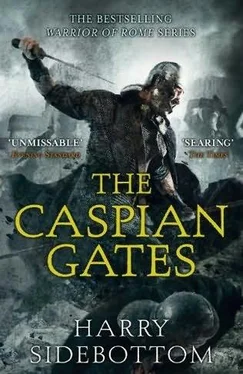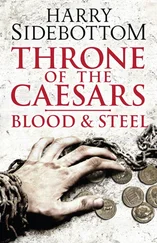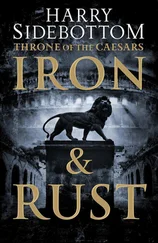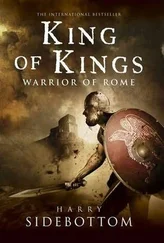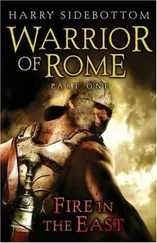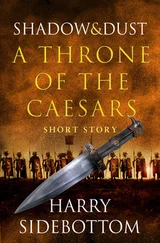Harry Sidebottom - The Caspian Gates
Здесь есть возможность читать онлайн «Harry Sidebottom - The Caspian Gates» весь текст электронной книги совершенно бесплатно (целиком полную версию без сокращений). В некоторых случаях можно слушать аудио, скачать через торрент в формате fb2 и присутствует краткое содержание. Жанр: Исторические любовные романы, на английском языке. Описание произведения, (предисловие) а так же отзывы посетителей доступны на портале библиотеки ЛибКат.
- Название:The Caspian Gates
- Автор:
- Жанр:
- Год:неизвестен
- ISBN:нет данных
- Рейтинг книги:3 / 5. Голосов: 1
-
Избранное:Добавить в избранное
- Отзывы:
-
Ваша оценка:
- 60
- 1
- 2
- 3
- 4
- 5
The Caspian Gates: краткое содержание, описание и аннотация
Предлагаем к чтению аннотацию, описание, краткое содержание или предисловие (зависит от того, что написал сам автор книги «The Caspian Gates»). Если вы не нашли необходимую информацию о книге — напишите в комментариях, мы постараемся отыскать её.
The Caspian Gates — читать онлайн бесплатно полную книгу (весь текст) целиком
Ниже представлен текст книги, разбитый по страницам. Система сохранения места последней прочитанной страницы, позволяет с удобством читать онлайн бесплатно книгу «The Caspian Gates», без необходимости каждый раз заново искать на чём Вы остановились. Поставьте закладку, и сможете в любой момент перейти на страницу, на которой закончили чтение.
Интервал:
Закладка:
On the second day, they came to a place where the marsh and the hills came close together, leaving a gap of no more than four or five miles. The following day, the barriers drew back and the plain spread out in freedom. Ballista thought about Calgacus and Wulfstan and the others. If Cumania had not fallen, they had been imprisoned within its walls for thirty-one days. The fort would make a very circumscribed prison: four identical circular rooms, stacked on top of each other, each no more than fifteen paces across – dark, damp and depressing. The strain of continual vigilance, of continual fear, both robbing the goodness from the defenders’ sleep. And worse in a way for Calgacus: the views of freedom from the roof walk – the Booted Eagles and Black Vultures soaring above the crags, the Alontas river tumbling down the gorge, past the walls of the fort, and then off to the north, unrestrained by the encircling horde of barbarians through which it ran.
Maximus would smile to hear such poetic views ascribed to Calgacus. But the Hibernian might be wrong. He did not know Calgacus as Ballista did. All Ballista’s life the old Caledonian had been there – from the time childhood memories stopped being isolated incidents and pictures and became something which could, at least with creative hindsight, be ordered into a rough narrative. Beneath the wheezing, cursing and foul-mouthed muttering, Calgacus was a kind man of surprising sensitivity. Ballista was determined to get the old bastard out.
Despite the sunshine, Ballista’s thoughts took a dark turn. If he raised the siege, Calgacus would not be free, merely returned to the strange armed exile to which Gallienus had sentenced them. There was no time limit to the sentence. They had no idea where it would be served next. It was unlikely they would be allowed to return home any day soon. It was as if a capricious deity had his eye on them. Who alive was closest to a god, if not the Roman emperor? The eye of Cronus was upon them.
Yet, in a way, Ballista could not help a feeling of almost gratitude towards Gallienus. The emperor had not killed them. He had not condemned them to a small island, to pointlessly wandering the beaches of Gyaros or Pandateria. It showed practicality – the imperium was getting use out of them at the ends of the world – and a certain magnanimity of soul.
Something from the treatise On Exile by Favorinus came to mind. Something about the philosopher wandering vast swathes of territory, Greek and barbarian, seeing and hearing what happened there and, by memorizing it, making it part of an education in virtue. From what Ballista could remember, there was nothing at all in the work that even hinted at the acquisition of alien wisdom. It was all Greek.
A Roman might have been a little different. They always boasted of their willingness to adopt the best of foreign things. But, apart from Greek culture, that really boiled down to weapons and military practices – a Spanish sword, a German war cry, the Punic word for ‘tent’. Ballista would follow them in that. He actually relished the chance to ride with the Sassanid clibanarii and see what war was like with them. And he had the dangerous opportunity to fight the nomadic Alani and see how they waged war.
But Ballista wanted to go further. He wanted to find out how the other peoples he was thrust among did things, how they regarded the world and the things in it. He was not going to fall into the trap of considering the customs of every people as good as each other. The Suani were too murderous; the Persians too god-haunted. But by looking at their attitudes, his own values might come more clearly into focus. The fable told that each man had a wallet on his back containing his failings. Those of others were easy to see; your own very difficult. Maybe exile could provide the chance to sit down, unstrap the wallet, bring it around to the front and examine its contents with care.
Duty, friends, family – in ascending order, Ballista had decided that these were what he was about. Trying not to let any of those three down, trying not to do things of which he would be too much ashamed. Pythonissa slipped into his thoughts. How did she fit into the image he was constructing of a man made better by being refined and tempered by exile? Allfather, what if Julia found out?
The warriors of Hamazasp were waiting for them on the far bank of the Alazonios river. It was a serious levy, twenty thousand or more, arrayed for war. The Iberian king was in the centre, mounted on a black Nisean charger, beneath a great black banner embroidered with a red bull. The men with Hamazasp outnumbered those with Narseh several times.
The Sassanid forces neatly manoeuvred into position: the clibanarii in the centre with Narseh, the light horse on either side, the Albanians out on the right flank.
The two armies watched each other across the water. The Iberians looked much like the Persians. But they were less well armed, and showed less discipline. The Persians sat quiet in their units, awaiting the words of command. The Iberians surged about, horse and foot intermingled. Their nobles caracoled their horses, sang out things in their native tongue.
Ballista spotted the tall, red-headed figure of Rutilus stationed with the nobility near Hamazasp.
Hamazasp and another rider, backed by half a dozen others, walked their horses out to midstream. The Alazonios was the border between Albania and Iberia. It was neutral ground, watched over by the deity of the river.
Narseh told just the mobad Manzik, young Gondofarr, Ballista and Pythonissa to accompany him. Obviously, the veteran Tir-mihr was to take command, should anything happen to the prince. The five riders splashed out into the river. Narseh halted the length of a horse from Hamazasp.
It was for Hamazasp to speak first. The water ran around the horses’ legs. The king of Iberia looked over those with the Sassanid prince. When he reached Ballista, he sneered.
At length, Hamazasp bowed in the saddle, blew a kiss. ‘Welcome the glorious Prince Narseh, son of the Mazda-worshipping divine Shapur, King of Kings of the race of the gods, grandson of the Mazda-worshipping divine Ardashir, King of Kings of the race of the gods, great-grandson of King Papak of the house of Sasan. I, Hamazasp, by the grace of Mazda king of Iberia, and my brother the pitiax, Oroezes, welcome you. How may we and the warriors of Iberia serve you?’
With a slight movement of the head, Narseh acknowledged this. ‘We thank you for the gracious words. In the name of my father Shapur, we wish to cross your land unhindered to drive the nomad Alani back through the Caspian Gates to the sea of grass.’
‘It shall be as you say.’
‘Furthermore, we wish you to provide food for our men, fodder for their horses.’
‘It shall be as you say.’
‘Furthermore, we wish you or your brother, the pitiax Oroezes, to join our expedition with one thousand horsemen, and to take a binding oath to these things.’
‘I will be honoured to lead my men to war with you.’ Hamazasp could not prevent the sly look on his face. ‘All will be as you wish, noble prince of the house of Sasan. But I have a petition. The late King Polemo of Suania unjustly seized territory from Iberia. If his daughter who rides with you will take an oath to return all the land up to the Dareine Pass, my warriors will fight all the more courageously in a just cause with friendship restored between the Iberians and the Suani.’
Narseh turned to Pythonissa. She curtly bowed her head.
Hamazasp took his oath first. It was in the Persian fashion. The mobad Manzik produced the salt, and the king of Iberia swore with his hand on that.
Pythonissa nudged her horse nose to tail with that of Hamazasp. The pitiax reached across her and tied her thumb to that of Hamazasp. The king of Iberia produced a knife. He cut his own thumb, then hers. ‘Neither with steel nor poison,’ he said. Raising their bound hands, he licked the blood from his own thumb then from that of the woman who had once been his daughter-in-law. ‘Sealed and countersealed in blood.’
Читать дальшеИнтервал:
Закладка:
Похожие книги на «The Caspian Gates»
Представляем Вашему вниманию похожие книги на «The Caspian Gates» списком для выбора. Мы отобрали схожую по названию и смыслу литературу в надежде предоставить читателям больше вариантов отыскать новые, интересные, ещё непрочитанные произведения.
Обсуждение, отзывы о книге «The Caspian Gates» и просто собственные мнения читателей. Оставьте ваши комментарии, напишите, что Вы думаете о произведении, его смысле или главных героях. Укажите что конкретно понравилось, а что нет, и почему Вы так считаете.
